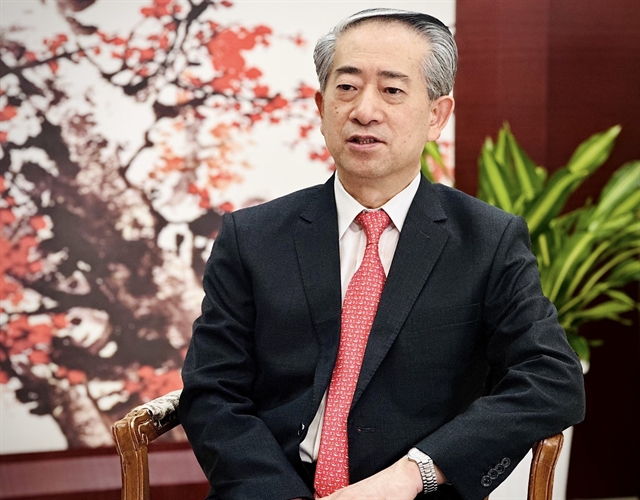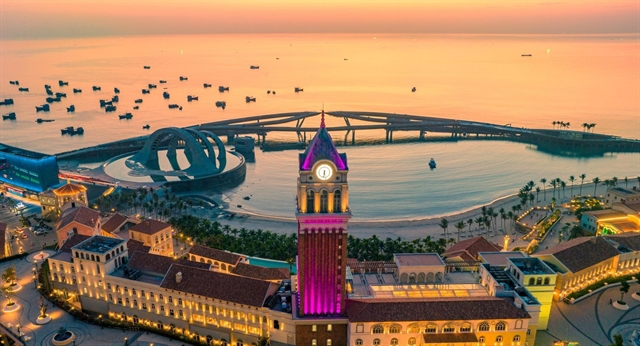 Politics & Law
Politics & Law

 |
| Chinese Ambassador to Việt Nam Xiong Bo in interview with the press. — VNA/VNS Photo |
HÀ NỘI — Through the upcoming visit of Party General Secretary and State President Tô Lâm, China hopes to continue carrying forward the China-Việt Nam traditional friendship, further consolidate bilateral political trust, and promoting the building of the China-Việt Nam community with a shared future that carries strategic significance, stated Chinese Ambassador to Việt Nam Xiong Bo.
The ambassador granted an interview to the press before Party General Secretary and President Tô Lâm and his spouse make a state visit to China from August 18-20 at the invitation of General Secretary of the Communist Party of China and Chinese President Xi Jinping and his spouse.
According to the ambassador, Party General Secretary and President Xi Jinping will hold talks with the visiting Vietnamese counterpart during the visit, and Premier Li Qiang, Chairman of the Standing Committee of the National People’s Congress of China Zhao Leji, and Chairman of the National Committee of the Chinese People’s Political Consultative Conference Wang Huning will also hold meetings with the Vietnamese leader.
Party General Secretary and President Lâm is scheduled to visit a number of Chinese locations where President Hồ Chí Minh conducted revolutionary activities, and meet with friendship associations, scholars and intellectuals of Việt Nam and China.
Xiong noted that this is the first visit abroad of Party General Secretary and President Lâm after he was elected to the top position in the Communist Party of Việt Nam. The visit is also a continuation of the very successful state visit to Việt Nam in 2023 by Party General Secretary and President Xi Jinping.
The visit shows the great importance that General Secretary and President Lâm attaches to the development of ties between the two Parties and countries, and demonstrates the priority in the diplomatic and external relations policy of each country, said the ambassador.
He said the Chinese side expects that the Vietnamese top leader's visit will continue carrying forward the China-Việt Nam traditional friendship, further consolidate bilateral political trust, and promote the building of the China-Việt Nam community with a shared future that carries strategic significance. The two countries will together follow their respective paths towards socialism and modernisation with distinctive characteristics, jointly advancing the global socialist cause, and contributing to regional and global peace, stability and development.
Việt Nam is reviewing the 40-year implementation of the cause of Đổi Mới (Renewal) and drafting documents for the 14th National Party Congress, he noted, adding that General Secretary and President Lâm on August 13 chaired an important meeting of standing members of the sub-committee in charge of drafting documents for the 14th congress. Therefore, this visit also provides a chance for the two sides to exchange experience in Party building and national governance, the diplomat said.
Noting that China and Việt Nam are making efforts to implement the common perceptions reached by top leaders of the two parties and the joint statement released during General Secretary and President Xi's visit to Việt Nam last year, Ambassador Xiong said the building of the China-Việt Nam community with a shared future that carries strategic significance has seen good first steps.
In terms of political relations, the two sides have maintained close exchanges and contact between top leaders of the two Parties and countries, he said, adding that in his lifetime, the late General Secretary Nguyễn Phú Trọng had maintained strategic and close exchanges with General Secretary and President Xi through flexible forms.
Ambassador Xiong also mentioned a successful visit to China in April by the then Vietnamese National Assembly Chairman, and highlighted that Prime Minister Phạm Minh Chính attended the World Economic Forum's Annual Meeting of the New Champions in China for the second time. In Beijing, PM Chính had a meeting with General Secretary and President Xi and other senior leaders of China. These meetings produced good results, he noted.
In addition, leaders of Vietnamese and Chinese Party agencies, ministries and localities have also conducted effective visits and meetings, he said.
Regarding security-defence, bilateral cooperation has become increasingly substantive. In April, the two armies held the eighth friendship defence border exchange which was a success. The new Chinese Minister of National Defence, Dong Jun, has held a productive talk with his Vietnamese counterpart Phan Văn Giang.
A hotline was established between the Việt Nam People's Navy and the Chinese People's Liberation Army's Southern Theater Command. Meanwhile, there have been visits by military ships and exchanges between young officers of the two countries, the ambassador said, affirming that very positive progress has been made in the two countries’ defence-security cooperation.
Bilateral economic-trade relations have kept a high momentum of growth. The ambassador cited Chinese statistics that showed in the first seven months of this year, two-way trade hit US$145 billion, a rise of 21 per cent year on year.
In the Jan-July period, Việt Nam exported $2.1 billion worth of fruits and vegetables to China. Particularly, Việt Nam's durian exports to China rose 46 per cent year on year to $1.22 billion, making up 92.4 per cent of Việt Nam's total exports of the fruit.
The two sides are speeding up the signing and finalisation of procedures for Việt Nam's frozen durians and fresh coconut to enter China, he said, expressing his belief that after the completion of the procedures, Việt Nam's farm produce export revenue to China will further increase.
In terms of investment, in early August, Chief Executive of China’s Hong Kong Special Administrative Region Lee Ka-chiu made an official visit to Việt Nam, and investment from Hong Kong (China) in Việt Nam amounted to $2.19 billion in the first seven months of this year, ranking second among foreign investors in Việt Nam. The ambassador said mainland China also invested $1.64 billion in Việt Nam in the period, ranking fourth, adding that however, in terms of the number of new projects, mainland China was at the top position.
In tourism, over 2.1 million Chinese visitors travelled to Việt Nam in the first seven months of this year, making China the second largest tourist market of Việt Nam.
The ambassador underscored that the two sides have worked hard together to realise the 2023 joint statement on the “six major goals" cooperation orientations, promoting collaboration in all fields and enjoyed positive results.
This year marks the 25th anniversary of the signing of the Việt Nam-China land border treaty and the 15th anniversary of the signing of the three legal documents on the Việt Nam-China land border.
Xiong said that the signing of the treaty has helped thoroughly solve the land border demarcation issue between the two countries legally, demonstrating the steadfast will and determination of both sides to work towards peace, friendship, and cooperation. This event has become a success model of how the two sides, through friendly consultations, have addressed the border issues, significantly enhanced mutual trust in dialogue and effectively addressed differences in other border and sea-related matters.
With the effective implementation of the treaty, people of both nations living along the shared borderline have stabilised their lives, coexisted harmoniously and had close bonds. The China-Việt Nam border has become one of the world’s most peaceful, stable, and harmonious border areas, with vibrant trade exchanges and people-to-people interactions, said Xiong.
The diplomat recalled then General Secretary of the Communist Party of Việt Nam Central Committee Nguyễn Phú Trọng’s trip to the Hữu Nghị (Friendship) - Youyi Guan international border gate in August 2023, during which the leader stressed that in the world, there is only one border area here where the border gate is named with the two words “Hữu Nghị”, making it unique globally. This vividly reflects the friendly exchanges at the border area between the two countries, he said, adding that it is a peaceful and secure border area that both can truly be proud of.
As the year 2025 will mark the 75th founding anniversary of China-Việt Nam diplomatic relations, Xiong held that both countries should continue to steadfastly implement the strategic orientations set forth by the top leaders of the two Parties; persist with the political guidance provided by the relationship between the two Parties for the two countries; support each other in following the path of socialism suitable to each country’s situation; and work together to further promote and deepen the comprehensive strategic cooperative partnership, and build a Việt Nam-China community with a shared future, which carries strategic significance.
The two countries should persist with cooperation in all aspects, as in the coming time, there are more opportunities for bilateral cooperation than challenges, the diplomat noted.
Both countries should work together to maintain a peaceful and stable environment to create favourable conditions for each country’s development, he said, believing that both nations treasure justice, fairness and rightness based on principles of international law, equality, and mutual benefit.
The Joint Statement 2023 outlines the "six major goals", including better management and settlement of differences. Therefore, the two nations must adhere to the common perceptions reached by the senior leaders of the two Parties and two countries, under which the two sides should pursue consultation and persistent dialogue to control and address differences, and to prevent differences from affecting the overall relationship, dispersing the efforts of both sides, or harming the sentiments of the two nations' people, the ambassador said. — VNS




